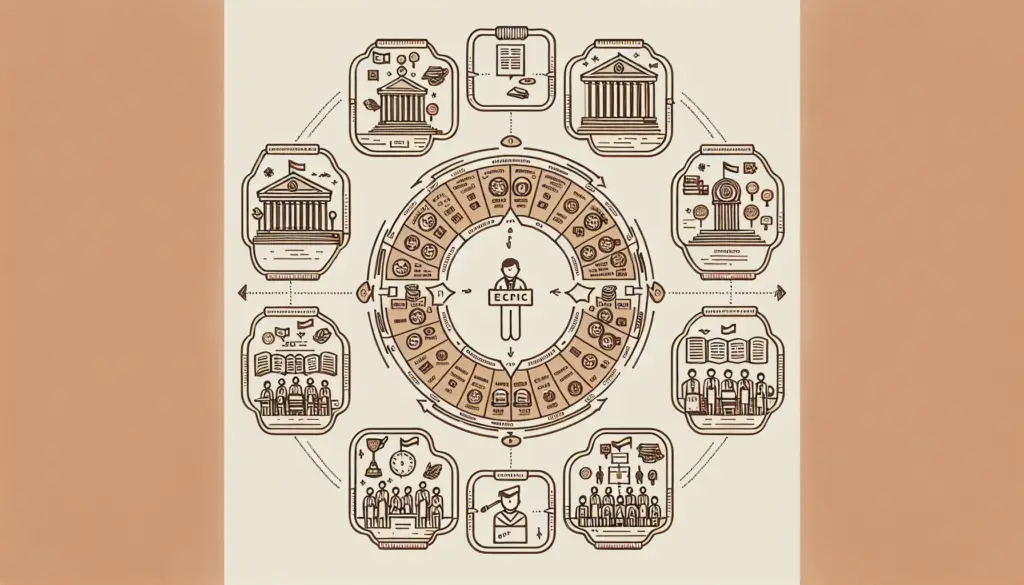Preparing for the UPSC Interview

Navigating the final stage of the UPSC examination, also known as the Personality Test, demands thorough preparation and a deep understanding of its importance. Here’s everything ias aspirants need to know to ace the interview.
Understanding the Importance
The UPSC interview is the last hurdle in the rigorous Civil Services Examination process. This stage is vital in assessing candidates’ communication skills, depth of knowledge, analytical abilities, and overall personality. For veterinary doctors, showcasing these attributes can make a significant impact on their rankings and placement.
The panel, while evaluating candidates, focuses intently on how they articulate their thoughts and choose their words. Eloquence and clarity in communication are paramount (Unacademy). The interview is not merely about factual knowledge but how well candidates can present and justify their opinions, reflecting their suitability for a public service career (Vajiram & Ravi).
Tips for Successful Preparation
To prepare effectively for the UPSC interview, especially for those coming from a veterinary background, candidates should focus on the following strategies:
Comprehensive Knowledge:
- Stay updated with current affairs. Explore resources like current affairs for IAS to remain informed about the latest happenings.
- Deep dive into the UPSC exam syllabus to ensure all topics are covered.
Mock Interviews:
- Engage in mock interviews to gain confidence. Practicing questions similar to IAS previous year question papers can provide valuable insights.
Articulate Communication:
- Polish communication skills by practicing eloquent and precise answers. The interview panel values clarity and the ability to convey thoughts logically (Unacademy).
Personal Insight:
- Reflect on personal experiences and relate them to the role of a civil servant. This personal touch can differentiate candidates in terms of their suitability for public service.
Ethics and Values:
- Brush up on ethics and moral principles as questions in this domain are common. Reviewing IAS exam pattern can help in understanding what to expect.
Critical Thinking:
- Develop the ability to analyze situations and think critically. The interview often involves questions assessing decision-making abilities (ClearIAS).
Recommended Preparation Checklist:
| Task | Timeline |
|---|---|
| Stay updated with current affairs | Daily |
| Practice mock interviews | Weekly |
| Review UPSC syllabus and previous papers | Bi-weekly |
| Work on communication skills | Continuous |
| Reflect on personal experiences | Monthly |
Preparing for the UPSC interview with dedication and a strategic approach can significantly enhance a candidate’s chances of success. For veterinary doctors, integrating their professional insights with general knowledge and communication skills is key. To dive deeper into specific domains and hone your understanding, visit related articles like tips for straightening curly hair and heat protectant for hair straightening.
The Format of the UPSC Interview
Understanding the format of the UPSC Interview is crucial for veterinary doctors aspiring to crack the IAS interview. This section will cover the duration, weightage, language options, and panel structure of the interview.
Duration and Weightage
The UPSC Interview, also known as the Personality Test, is a critical component of the overall examination process. It typically lasts around 30 minutes and carries a weightage of 275 points Unacademy. The final merit list for the IAS is created based on the results from both the main examination and the interview. Scoring well in the interview can significantly improve a candidate’s rank and chances of receiving a preferred posting.
| Component | Duration | Weightage (Points) |
|---|---|---|
| UPSC Interview | 30 mins | 275 |
Language Options and Panel Structure
Candidates have the option to choose the language of their preference for the UPSC Interview. This includes English, Hindi, or any other regional language listed by the UPSC Unacademy. This flexibility ensures that candidates can express themselves comfortably and effectively during the interview.
The interview is conducted by a board comprising multiple panel members. Each panel is designed to be competent and unbiased, ensuring a fair assessment of the candidate’s suitability for a career in public service. The nature of the questions typically focuses on matters of general interest, assessing the candidate’s personal suitability ClearIAS.
| Aspect | Details |
|---|---|
| Language Options | English, Hindi, Regional Languages |
| Panel Structure | Multiple Panel Members, Competent and Unbiased |
Understanding the format of the interview helps candidates to prepare effectively and strategically. For more information, check out our sections on upsc exam syllabus and ias exam pattern.
Key Aspects of the UPSC Interview
Understanding the unique aspects of the UPSC Interview can give candidates, including veterinary doctors, an edge in this crucial stage. This section delves into how candidates are assessed and how their performance impacts their ranking and placement.
Assessing Candidates’ Skills
The UPSC Interview, also known as the Personality Test, serves to evaluate various skills and attributes essential for a successful career in public service. The panel focuses on several key areas:
Communication Abilities: Candidates are evaluated on their clarity of speech, the coherence of thoughts, and the ability to articulate ideas effectively. This is particularly important for roles demanding regular public interaction and leadership. As Unacademy highlights, the selection of words and verbal articulation are closely monitored.
Depth of Knowledge: Beyond knowing the UPSC exam syllabus, candidates must showcase a solid understanding of their field, current events, and general knowledge. This depth ensures they are well-prepared to face diverse challenges in their roles.
Analytical Skills: The interview assesses how adeptly candidates analyze situations and problems. The ability to think critically and propose effective solutions is essential. Vajiram & Ravi emphasize the importance of decision-making acumen.
Personality Traits: The interview aims to understand candidates’ overall personalities and suitability for civil services. Traits such as confidence, ethical judgment, and emotional intelligence are crucial.
| Assessment Area | Description |
|---|---|
| Communication | Clarity of speech, coherence of thoughts, verbal articulation |
| Knowledge | Understanding of field-related content, current affairs, and general knowledge |
| Analytical Skills | Critical thinking, problem-solving abilities |
| Personality Traits | Confidence, ethical judgment, emotional intelligence |
Impact on Ranking and Placement
Achieving a notable score in the UPSC Interview can significantly influence a candidate’s overall ranking and placement. The Interview carries a weightage of 275 marks out of the total 2025 marks, as explained by Vajiram & Ravi. This is a substantial share that can make a significant difference in the final tally.
Boosting Rank: A high score in the Interview can elevate a candidate’s total score, potentially improving their rank. This enhancement is crucial given the competitive nature of the IAS exam pattern.
Placement Opportunities: A superior rank opens doors to more favorable positions within government services. The performance during the Interview, therefore, is a critical determinant of future career prospects. As Unacademy notes, excelling in the Interview enhances chances of securing top-tier posts.
| Component | Max Marks | Impact |
|---|---|---|
| UPSC Interview | 275 | Significant influence on total score and ranking |
| Total Marks (Exam + Interview) | 2025 | Determines final rank and placement opportunities |
The UPSC Interview not only assesses various skills but also plays a pivotal role in shaping the candidate’s career trajectory within the civil services. By understanding these aspects and preparing thoroughly, candidates can navigate this stage with confidence and increase their chances of success. For more on the types of questions that may be asked, explore ias previous year question papers.
Navigating UPSC Interview Questions
The IAS Interview is an important part of the UPSC selection process. It is essential for veterinary doctors aiming for the IAS to be well-prepared and familiar with the range of topics and types of questions they may encounter.
Range of Topics Covered
The UPSC IAS Interview questions encompass a wide array of topics designed to evaluate a candidate’s knowledge, understanding, and analytical skills. According to Vajiram & Ravi, the topics can broadly include:
- Current Affairs
- General Knowledge
- Ethics and Values
- Governance and Administration
- Policy and Decision-Making
- Personal Background and Experiences
- Opinions on Socio-Political Issues
- Role of a Civil Servant
- International Relations and Diplomacy
For instance, candidates might be asked about recent government policies, the role of media in society, sustainable development in economics, or the impact of climate change on India (PWOnlyIAS). This wide range ensures that candidates are assessed on multiple dimensions relevant to the civil services.
Types of Questions Asked
The types of questions posed in the UPSC IAS Interview can vary significantly. They are crafted to evaluate different aspects of a candidate’s capabilities and personality. Here’s a breakdown:
| Question Type | Example |
|---|---|
| Current Affairs | “What are your thoughts on the recent changes in India’s agricultural policies?” |
| General Knowledge | “Can you discuss the significance of the Non-Aligned Movement in modern geopolitics?” |
| Ethics | “How would you handle a situation where you must choose between transparency and confidentiality?” |
| Governance | “What are the most pressing issues in public health administration today?” |
| Personal Experience | “Can you share an instance where your veterinary background influenced your decision-making?” |
The goal of these questions is to delve into a candidate’s depth of understanding, analytical prowess, and ability to think critically and clearly (Vajiram & Ravi). For veterinary doctors, it is crucial to relate their answers back to their field and demonstrate the unique perspectives they bring to the civil services roles.
By navigating through this diverse range of topics and types of questions, candidates can better prepare for what to expect in the IAS Interview process. For more comprehensive insights on each of these aspects, consider exploring our articles on the UPSC exam syllabus and current affairs for IAS. Additionally, reviewing IAS previous year question papers can provide valuable practice and understanding of the interview’s demands.
Sample UPSC Interview Questions
Current Affairs and General Knowledge
The UPSC IAS interview places a strong emphasis on a candidate’s awareness of current events and general knowledge. The questions can range from recent government policies to significant global issues.
Examples:
- “What are your thoughts on the recent changes in agricultural policies in India?”
- “How does climate change impact veterinary practices and animal health in India?”
| Question Type | Example |
|---|---|
| Government Policies | “Discuss the implications of the latest health policy on rural veterinary services.” |
| Global Issues | “Explain the role of India in climate change initiatives and how it affects the livestock sector.” |
For detailed studies on current affairs, visit our section on current affairs for IAS.
Ethics and Values
Ethics and values form a crucial part of the UPSC interview, as they help the panel assess a candidate’s integrity and moral compass. These questions often relate to real-life scenarios and the candidate’s personal experiences.
Examples:
- “How would you handle a situation where a senior official asks you to overlook a minor compliance issue?”
- “Discuss a time when you faced an ethical dilemma in your professional career and how you resolved it.”
| Question Type | Example |
|---|---|
| Ethical Dilemmas | “What would you do if you discovered a colleague involved in unethical practices?” |
| Personal Experiences | “Describe an instance where your ethical values were challenged and the resolution.” |
To brush up on IAS interview preparation, explore our guide on IAS previous year question papers.
Governance and Administration
Expect questions that probe your understanding of governance and administrative principles. This could encompass policy-making, implementation, and your opinions on administrative matters.
Examples:
- “What are the main challenges faced in the implementation of veterinary public health policies?”
- “How can the role of a veterinary doctor be enhanced in rural governance?”
| Question Type | Example |
|---|---|
| Policy Implementation | “Analyze the effectiveness of recent policies in improving animal welfare in rural areas.” |
| Administrative Challenges | “What administrative changes would you suggest to integrate veterinary services with public health management?” |
For a deeper understanding of the topics covered in the IAS exams, see our section on UPSC exam syllabus.
These sample questions give a glimpse into the broad spectrum of topics asked during the UPSC IAS interview. Candidates should prepare thoroughly, considering both the general and specific aspects of their field to succeed in this challenging interview.
Performance Tips for the UPSC Interview
Excelling in the UPSC Interview, also known as the Personality Test, is crucial for veterinary doctors aiming to secure a top civil services position. It’s essential to showcase effective communication skills and strong analytical abilities during the interview. Let’s delve into how one can sharpen these aspects to leave a lasting impression.
Communication and Clarity
Clear and effective communication is key during the UPSC Interview. It helps convey your thoughts precisely and leaves a positive impression on the interview panel.
- Articulate Answers: Ensure your responses are succinct and to the point. Avoid rambling and stay focused on answering what has been asked.
- Speak Confidently: Speak with confidence, maintaining eye contact with the interview panel. Confidence reflects competence and helps build trust.
- Body Language: Non-verbal cues like posture, gestures, and facial expressions matter. Sit upright, use meaningful gestures, and maintain a friendly demeanor.
- Practice Active Listening: Listen carefully to the questions before responding. This demonstrates respect and helps you provide accurate answers.
- Prepare for Common Questions: Familiarize yourself with ias interview questions to understand what the panel might ask. Topics might range from current affairs and general knowledge to ethics and values.
Demonstrating Analytical Skills
Analytical skills reflect your ability to think critically and solve problems effectively. These are highly valued during the UPSC Interview.
- Logical Reasoning: Structure your answers logically. Break down complex questions into smaller parts and address each part systematically.
- Depth of Understanding: Show a deep understanding of the topics you discuss. Provide thoughtful insights and avoid superficial answers.
- Ethical Considerations: When discussing scenarios, highlight ethical implications and demonstrate a balanced approach. Refer to our section on ethics and values for common ethical questions.
- Use Examples: Back your answers with relevant examples or case studies, especially if related to your field of veterinary medicine.
- Stay Informed: Keep abreast of current affairs for ias to discuss contemporary issues intelligently.
Suggested Table: Analytical Skills Evaluation
| Skill | Description | Example Question |
|---|---|---|
| Logical Reasoning | Ability to think in a structured, coherent manner | “How would you address the issue of stray animals in urban areas?” |
| Depth of Understanding | Detailed knowledge of issues | “Discuss the impact of climate change on wildlife.” |
| Ethical Considerations | Awareness of ethical implications | “What ethical dilemmas might a veterinary doctor face in government service?” |
| Use of Examples | Applying real-world examples | “Can you discuss a case where veterinary skills improved community health?” |
By focusing on clear communication and demonstrating analytical prowess, aspirants can enhance their performance and stand out in the UPSC Interview. Explore our resources on upsc exam syllabus and ias exam pattern to further prepare for this crucial step in your journey.






Responses